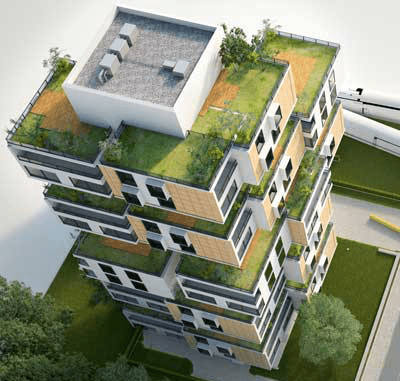Mehak Gupta
MBS School of Planning and Architecture,
New Delhi, India
Prabhjot Singh
Indian Institute of Technology Ropar, India
Asad Sahir
Indian Institute of Technology Ropar, India
Corresponding Author: asad.sahir@iitrpr.ac.in
Cite this article
Highlights
- Academic Institutions are encouraged to leverage energy efficiency and water conservation goals in future planning to cut on operation costs.
- 27% reduction may be achieved by a combination of rainwater harvesting and use of fixtures.
- 220 MWh renewable energy generation potential exists with the envisaged building.
- Government of India’s New Education Policy 2020 is not only curricula change but also invites new building concepts.
- Solar Decathlon India’s Educational Building Contest is an important avenue for idea generation.
Abstract
Academic institutions are excited about the opportunities that are showcased by the Government of India’s New Education Policy 2020 regarding the potential impact that it can have on learners. Inspired by this important development, a team of engineering and architecture students took the initiative to consider exploring energy-efficient building designs through the Solar Decathlon India contest in support of the new policy. The team contributed to developing a concept for a “Student Life Centre” – a building that particularly deals with student activities to enable them to pursue their passions along with their studies. This idea was a unique concept for an educational building as participating students got an opportunity to visualize and appreciate the economic aspects. From the author’s analysis, before introducing coursework based on the New Education Policy in curricula, academic institutions may benefit if they visualize the options that the built environment may offer in accelerating learning.
Keywords
Education, Solar Decathlon India, Energy-Efficient Buildings, Governance, Building Science
References
- “New Education Policy, 2020”: https://www.education.gov.in/sites/upload_files/mhrd/files/NEP_Final_English_0.pdf
- “Solar Decathlon India Team Report,” Indian Institute of Technology Ropar, April 2021. https://solardecathlonindia.in/wp-content/uploads/2021/05/1_D4_EDU_Tejasvi-IIT-Ropar.pdf
- K. V. Poeck, L. Östman, and T. Block. “Opening up the black box of learning-by-doing in sustainability transitions.” Environ. Innov. Soc. Transit., vol. 34, pp. 298-310, 2020. https://doi.org/10.1016/j.eist.2018.12.006
- P. Medved, U. Urša Golob, and T. Kamin. “Learning and diffusion of knowledge in clean energy communities.” Environ. Innov. Soc. Transit., vol. 46, 100701, 2023. https://doi.org/10.1016/j.eist.2023.100701
- M. Singer-Brodowski, “The potential of transformative learning for sustainability transitions: moving beyond formal learning environments.” Environ. Dev. Sustain., 1-19, 2023. https://doi.org/10.1007/s10668-022-02444-x
- K. Voss, I. K. Rizaoglu, A. Balcerzak, and H. Hansen, “Solar energy engineering and solar system integration-The solar Decathlon Europe 21/22 student competition experiences.” Energ. Buildings, vol. 285, 112891, 2023. https://doi.org/10.1016/j.enbuild.2023.112891
- I. Navarro, et al. “Experiences and methodology in a multidisciplinary energy and architecture competition: Solar Decathlon Europe 2012.” Energ. Buildings, vol. 83, pp. 3-9, (2014). https://doi.org/10.1016/j.enbuild.2014.03.073
- M. Casini, “A positive energy building for the middle east climate: ReStart4Smart solar house at solar decathlon middle east 2018.” Renewable Energy, vol. 159, pp. 1269-1296, 2020. https://doi.org/10.1016/j.renene.2020.06.055
- F. Fantozzi, et al. “Solar Decathlon ME18 competition as a” learning by doing” experience for students: The case of the team HAAB,” In 2018 IEEE Global Engineering Education Conference (EDUCON). IEEE, pp. 1865-1869, 2018 https://doi.org/10.1109/EDUCON.2018.8363462
- K. Ortegon, “Developing student outcomes in real-world learning experiences: The case of solar decathlon in Latin America.” 2016 ASEE Annual Conference & Exposition. 2016.
- R. Herrera-Limones, J. Rey-Pérez, M. Hernández-Valencia, and J. Roa-Fernández, “Student competitions as a learning method with a sustainable focus in higher education: The University of Seville “Aura Projects” in the “Solar Decathlon 2019,” Sustainability, vol. 12, no. 4, 1634, 2020. https://doi.org/10.3390/su12041634
- R. Amaral, A. Beatriz Arranz, and S. Vega. “Participatory Research for the Evaluation of Satisfaction with Solar Decathlon Competitions: A Survey Analysis,” Sustainability, vol. 13, no. 23, 12995, 2021. https://doi.org/10.3390/su132312995
- M. Young, R. Romero, J. Stershic, T. Ryan, and H. Jamesen Carr, “The Future of Building Science Education with the US Department of Energy Solar Decathlon.” 2022 ASEE Annual Conference & Exposition. 2022.
- “MPower.” https://mpowerminds.com/about
- “Harvard University – Richard and Susan Smith Center”. https://commonspaces.harvard.edu/smith-campuscenter/architect-and-building-history
- “Stanford University.” https://drive.google.com/file/d/1Qqo5KfDUbvjEJjsh5zK7lDiOf_NtOiX5/view?pli=1
- “Ecole Polytechnique Fédérale de Lausanne.” https://www.lausanne-tourisme.ch/en/explore/the-rolexlearning-center/

 Bishal Thapa
Bishal Thapa





 Fred Sherman
Fred Sherman Sumedha Malaviya
Sumedha Malaviya Satish Kumar
Satish Kumar












 The three main global energy concerns of providing access to modern energy, enhancing the security of the energy supply, and minimising the impact of energy systems on the climate have an impact on both national and international energy governance. To develop solutions that address the many facets of these difficulties, however, a variety of actors and stakeholders must be included due to the complexity of the energy challenges.
The three main global energy concerns of providing access to modern energy, enhancing the security of the energy supply, and minimising the impact of energy systems on the climate have an impact on both national and international energy governance. To develop solutions that address the many facets of these difficulties, however, a variety of actors and stakeholders must be included due to the complexity of the energy challenges. Cities are responsible for more than 70% of the world’s energy consumption and 40% to 50% of its greenhouse gas emissions. Managing increasing urbanisation is a challenge, and nations must deal with the effects it will have on the environment in terms of energy and climate.
Cities are responsible for more than 70% of the world’s energy consumption and 40% to 50% of its greenhouse gas emissions. Managing increasing urbanisation is a challenge, and nations must deal with the effects it will have on the environment in terms of energy and climate. Our transition to a future with lower carbon emissions depends heavily on buildings. They are our places of residence, rest, and employment; they also account for around one-third of the world’s greenhouse gas emissions and nearly 40% of the world’s energy usage.
Our transition to a future with lower carbon emissions depends heavily on buildings. They are our places of residence, rest, and employment; they also account for around one-third of the world’s greenhouse gas emissions and nearly 40% of the world’s energy usage.